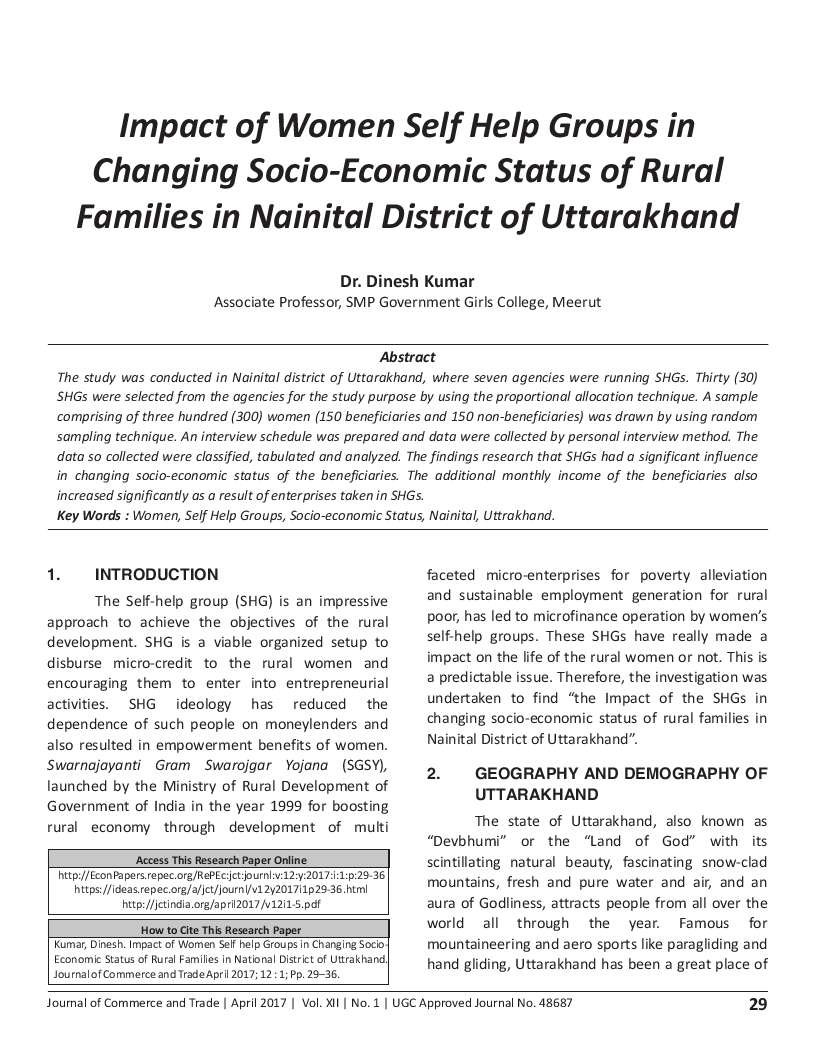Impact of Women Self Help Groups in Changing Socio-Economic Status of Rural Families in Nainital District of Uttarakhand
DOI:
https://doi.org/10.26703/jct.v12i1.119Keywords:
Women, Self Help Groups, Rural Families, Nainital District, UttarakhandAbstract
The study was conducted in Nainital district of Uttarakhand, where seven agencies were running SHGs. Thirty (30) SHGs were selected from the agencies for the study purpose by using the proportional allocation technique. A sample comprising of three hundred (300) women (150 beneficiaries and 150 non-beneficiaries) was drawn by using random sampling technique. An interview schedule was prepared and data were collected by personal interview method. The data so collected were classified, tabulated and analyzed. The findings research that SHGs had a significant influence in changing socio-economic status of the beneficiaries. The additional monthly income of the beneficiaries also increased significantly as a result of enterprises taken in SHGs.
Downloads
Metrics
References
Agarwal, Himanshu. 2009. Women contribution in Rural Development. The Journal of The Meerut University History Alumni, 13, ISSN 0973-5577. 120-126. 10.5281/zenodo.5816357
Anjugam, M.; Ramasamy, C. 2007. Determinants of women’s participation in self-help group (SHG)-led microfinance programme in Tamil Nadu. Agricultural Reasearch Reviews, 22 (2), 283-289.
Banerjee, G. D. 2002. Evaluation study on self help group. Financing Agriculture-In house. Journal of Agricultural Finance Corporation Ltd., 34 (2), 38-42.
Biswas, S et al. 2013. Knowledge level of improved animal husbandry prictices and its liaison with functional traits of self-help groups of rural dairy farmers in West Bengal. Animal Science Reporter, 7 (1), 20-27.
Das R. M., 2004. Micro-finance through SHGS : A boon for rural poor. Kurukshetra, 52 (4) : 25.
Devalatha, C. M. 2005. Profile study of women self help groups in Gadag district of northern Karnataka. Msc (Agri) thesis, University of Agricultural Sciences, Dharwad, Karnataka, India.
Indumathi, C.; Palanivelu, P. 2013. Women empowerment through self help groups. Global Research Analysis, 2 (6), 27-30.
Kadian, K.S. 2011. Socio-economic empowerment of dairy women through self help groups in Haryana. International conference on tropical island ecosystems, 23-26 March 2011, Central Agricultural Research Institure, Port-Blair, Andaman & Nicobar.
Kaur, M. 2005. Impact of self help groups promoted by urmul Seemant Samiti, Bajju rural women of Kolayat Block (Bikaner district). M.Sc. Thesis submitted to RAU, Bikaner.
Kavathalkar, NG et al. 2007. Constraints in adoption of scientific recommendation in feeding of dairy animals in Nagpur district. Indian Dairyman, 59 (12), 51-55.
Kay, T. 2002-03. Empowering women through self help micro-credit programmes. Bulletin on Asian-Pacific Perspectives, 2002-03.
Mathew, E. 2006. Microfinance and collective action: A study of self help groups in Kerala. PhD thesis, University of Mysore, Karnataka, India.
Meena, H.R.; Fulzele, R.M. 2006. Constraints perceived by the Meena tribes in adoption of improved dairy farming practices. Indian Research Journal of Extension Education, 6 (1&2), 52-54.
Meganathan, M. 2011. Role of microfinance on urban women self help groups: A micro study- Puducherry. Journal on Banking Financial Services & Insurance Research, 1 (5), August 2011.
Mehta, G.S. 1999. Development of Uttarakhand: Issues and Perspectives. APH Publishing Corporation, New Delhi.
Mishra J. C. and Tiwari, R. K. 2004. Indian Banking system: Micro finance. Kurukshetra, 48 (6) : 29.
Mohammad, A.; Gupta, J. 2011. Milk disposal pattern of dairy farmers in Western Bengal, India. Animal Science Reporter, 5 (3), 111-116.
Nair, A. 2005. Sustainability of microfinance self help groups in India: Would federating help? www.elibrary.worldbank.org.
OPHI. 2011. Oxford Poverty and Human Development Institute (OPHI) Multidemensional Poverty Index (MPI) at a glance - India. Oxford Department of International Development, Queen Elizabeth House, University of Oxford, UK. (www.orphi.org.uk)
Pande, P.N. 1996. Drudgery of the Hill Women. Indus Publication Co., New Delhi.
Rajput, D.S.; Tripathi, H. 2012. Evaluation of pastoralists’ satisfactions regarding availability of animal health services in arid zone of Rajasthan. Animal Science Reporter, 6 (2), 53-59.
Rangi, PS et al. 2002. Economic empowerment of rural women through self help groups: A case study of Fategarh Sahib District (Punjab). Man and Development, 24 (3), 65-78.
Rao, D. V. 2003. SHGs and social change. Social Welfare, 50 (2) 24.
Singh, M.; Chauhan, A. 2006. Constraints faced by owners in adoption of scientific dairy farming practices. Indian Journal of Dairy Science, 59 (1), 49-51.
Suriakanthi, A 2000. Literacy - essential for SHGs. Social Welfare, 47 (6), 32-34.

Additional Files
Published
How to Cite
Issue
Section
License
Copyright (c) 2017 Journal of Commerce and Trade

This work is licensed under a Creative Commons Attribution 4.0 International License.







